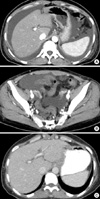Abstract
Among many adverse effects of docetaxel, fluid retention is a well recognized, cumulative side effect, but severe fluid retention is rare. We report here on a case of docetaxel-induced severe fluid retention with peripheral edema, pleural effusion, severe ascites and pericardial effusion in a 41-year-old woman. She had been treated with 3 cycles of docetaxel 9 days previously and she was admitted to our hospital due to abdominal distention and mild dyspnea. Radiologic studies revealed pleural effusion, severe ascites and a small pericardial effusion. Diuretics were given for 21 days. The pleural effusion was resolved after treatment with diuretics for 2 days, but the ascites wasn't resolved until 14 days of diuretics. After treatment with diuretics for 21 days, all the symptoms of the patient were completely resolved. Early detection is mandatory and diuretics are very effective for patient suffering with docetaxel-induced severe fluid retention.
Figures and Tables
 | Figure 1Large amount of ascites in the lower and upper abdomen are demonstrated on abdominal computerized tomography scan (A, B). After medication of diuretics for 21 days, previous noted ascites are not visible (C). |
 | Figure 2A posteroanterior chest radiograph shows pleural effusion with blunting on costophrenic angle at both sides (A). After treatment of diuretics for 2 days, decreased amount of pleural effusion are noted at both sides (B). |
 | Figure 3Small amount of pericardial effusion is demonstrated at pericardial space of right atrium (thick arrow) and right ventricle (thin arrow) on echocardiogram (A). On following echocardiogram after treatment of diuretics for 9 days, amount of pericardial effusion in the right atrium is decreased and pericardial effusion in the right ventricle is not demonstrated (B). |
References
1. Yvon AM, Wadsworth P, Jordan MA. Taxol suppresses dynamics of individual microtubules in living human tumor cells. Mol Biol Cell. 1999. 10:947–959.

2. Valero V, Holmes FA, Walters RS, Theriault RL, Esparza L, Fraschini G, et al. Phase II trial of docetaxel: a new, highly effective antineoplastic agent in the management of patients with anthracycline-resistant metastatic breast cancer. J Clin Oncol. 1995. 13:2886–2894.

3. Piccart MJ, Klijn J, Paridaens R, Nooij M, Mauriac L, Coleman R, et al. Corticosteroids significantly delay the onset of docetaxel-induced fluid retention: final results of a randomized study of the European Organization for Research and Treatment of Cancer Investigational Drug Branch for Breast Cancer. J Clin Oncol. 1997. 15:3149–3155.

4. Baker J, Ajani J, Scotte F, Winther D, Martin M, Aapro MS, et al. Docetaxel-related side effects and their management. Eur J Oncol Nurs. 2009. 13:49–59.

5. Ferraresi V, Milella M, Vaccaro A, D'Ottavio AM, Papaldo P, Nistico C, et al. Toxicity and activity of docetaxel in anthracycline-pretreated breast cancer patients: a phase II study. Am J Clin Oncol. 2000. 23:132–139.

6. Ryu DW, Jun CW, Lee CH. Neoadjuvant chemotherapy with docetaxel and adriamycin in breast cancer: clincopathologic factors influencing to response rate. J Breast Cancer. 2008. 11:89–94.

7. Tomiak E, Piccart MJ, Kerger J, Lips S, Awada A, de Valeriola D, et al. Phase I study of docetaxel administered as a 1-hour intravenous infusion on a weekly basis. J Clin Oncol. 1994. 12:1458–1467.

8. Semb KA, Aamdal S, Oian P. Capillary protein leak syndrome appears to explain fluid retention in cancer patients who receive docetaxel treatment. J Clin Oncol. 1998. 16:3426–3432.

9. Fossella FV, Lee JS, Murphy WK, Lippman SM, Calayag M, Pang A, et al. Phase II study of docetaxel for recurrent or metastatic non-small-cell lung cancer. J Clin Oncol. 1994. 12:1238–1244.

10. McKeage K, Keam SJ. Docetaxel in hormone-refractory metastatic prostate cancer. Drugs. 2005. 65:2287–2294.





 PDF
PDF ePub
ePub Citation
Citation Print
Print


 XML Download
XML Download